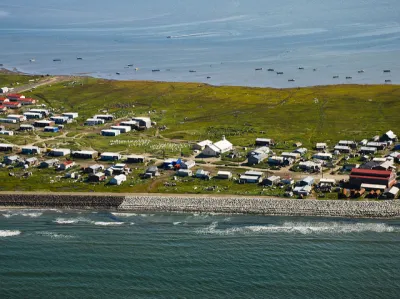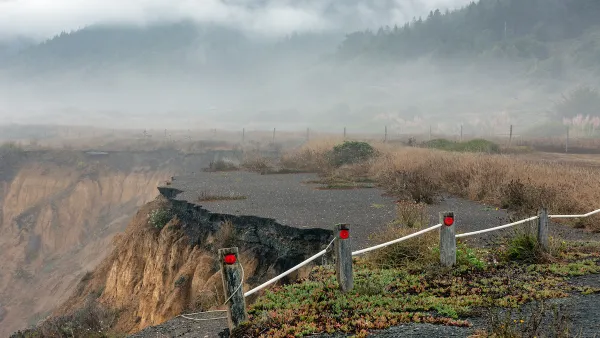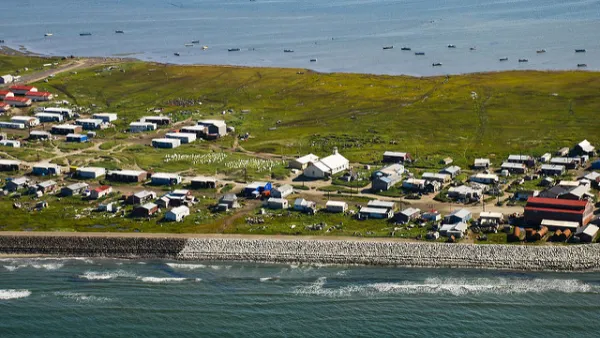Coastal communities are battling the near certain rising sea levels. As a result, many are faced with the choice to stay and rebuild their homes or begin the process of "managed retreat" away from vulnerable coastal areas.

It is no secret that the Trump Administration is working fast to dismantle climate protections, presenting some of the most environmentally vulnerable communities with the harsh realities of what the future holds for their beloved homes. In some instances, the cost of protective infrastructure—from natural coir logs to engineered sea walls—are far too costly to implement as protective barriers from natural hazards. Although the data varies on severity, research has confirmed that sea levels are rising and will ultimately impact established communities in coastal areas. In some instances, water inundation will be so severe that the areas will be uninhabitable. In the face of climate change and sea level rise, some communities in the United States and abroad are considering "managed retreat."
"Managed retreat" is the process by which local, state and federal governmental agencies work together to create a strategically planned retreat from a sea level rise vulnerable community and work collectively to resettle the displaced citizens. Tom Ashbrook of WBUR 90.9 writes "managed retreat [is] an orderly surrender to rising oceans." On air, Ashbrook interviews three professionals who have studied managed retreat, its application in coastal areas and the implications.
Since the 1980s, FEMA has offered a version of managed retreat—offering to buy storm-damaged homes and homes likely to be damaged again due to an extreme weather event—purchasing homes and converting them to natural open space. This program, however, is entirely voluntary for the homeowners. So while this is one attempt at incentivizing homeowners in post-disaster recovery to relocate away from their communities it does little to concentrate and make significant impacts in managed retreat.
"Managed retreat is a potentially important climate change adaptation option, providing an alternative to structural protection or accommodation measures to manage natural hazard risk," reports Miyuki Hino of her study, "Managed retreat as a response to natural hazard risk." States like Louisiana and Florida are most susceptible to the effects of sea level rise, reports Ben Strauss. And Robin Bronen asserts that in Alaska, villages are warming, losing ice, becoming more unstable, and ultimately contributing to the acceleration of inhabitable lands. "Sea level is rising everywhere, but not everyone has the same amount of resources. And this will be a huge equity issue."
Managed retreat may seem like an impossibility to some communities and the costs associated with relocation are astronomical, however, this climate change adaptation strategy may become the most cost effective strategy to protect communities from rising tides.
FULL STORY: Climate Change Threats, Managed Retreats

Analysis: Cybertruck Fatality Rate Far Exceeds That of Ford Pinto
The Tesla Cybertruck was recalled seven times last year.

National Parks Layoffs Will Cause Communities to Lose Billions
Thousands of essential park workers were laid off this week, just before the busy spring break season.

Retro-silient?: America’s First “Eco-burb,” The Woodlands Turns 50
A master-planned community north of Houston offers lessons on green infrastructure and resilient design, but falls short of its founder’s lofty affordability and walkability goals.

Test News Post 1
This is a summary

Analysis: Cybertruck Fatality Rate Far Exceeds That of Ford Pinto
The Tesla Cybertruck was recalled seven times last year.

Test News Headline 46
Test for the image on the front page.
Urban Design for Planners 1: Software Tools
This six-course series explores essential urban design concepts using open source software and equips planners with the tools they need to participate fully in the urban design process.
Planning for Universal Design
Learn the tools for implementing Universal Design in planning regulations.
EMC Planning Group, Inc.
Planetizen
Planetizen
Mpact (formerly Rail~Volution)
Great Falls Development Authority, Inc.
HUDs Office of Policy Development and Research
NYU Wagner Graduate School of Public Service




























